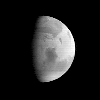

Click on image for full resolution version
Mars Global Surveyor Mars Orbiter Camera Release: MOC2-2
Mars Global Surveyor Mars Orbiter Camera Image ID: 556579886.61
Caption
This image was acquired by the Mars Global Surveyor (MGS) Mars Orbiter
Camera (MOC) on August 20, 1997, when MGS was 5.51 million kilometers
(3.42 million miles) and 22 days from encounter. At this distance,
the MOC's resolution is about 20.6 km per picture element, and the
6800 km (4200 mile) diameter planet is about 330 pixels across. North
is at the top of the image. The MGS spacecraft pointed the camera at
the center of the planet (near the dark, morning sunrise line, or
terminator) at 23.6° N, 307.3° W. The irregularity
of the terminator seen in this image results from contrast processing.
This image shows the prominent dark feature Syrtis Major, believed to
be a relatively dust-free area of bedrock outcrop and sand dunes. The
large Hellas impact basin (2000 km or 1250 miles across) is seen at
the bottom of the picture. Clouds from the south polar region fill
the basin. The north polar residual ice cap, surrounded by a dark
annulus of sand, is seen at the top of the picture.
Launched on November 7, 1996, Mars Global Surveyor will enter Mars
orbit on Thursday, September 11 around 6:30 PM PDT. After Mars Orbit
Insertion, the spacecraft will use atmospheric drag to reduce the size
of its orbit, achieving a circular orbit only 400 km (248 mi) above
the surface in March 1998, when mapping operations will begin. At
that time, MOC narrow angle images will be 14,000 times higher
resolution than this picture, and global wide angle images will be 3
times better.
Malin Space Science Systems and the California Institute of Technology
built the MOC using spare hardware from the Mars Observer mission.
MSSS operates the camera from its facilities in San Diego, CA. The
Jet Propulsion Laboratory operates the Mars Global Surveyor spacecraft
with its industrial partner, Lockheed Martin Astronautics, from
facilities in Pasadena, CA and Denver, CO.


